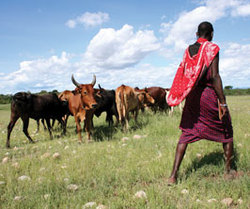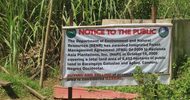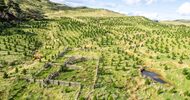Meles Zenawi`s land lease and famine in Ethiopia
By Seifu Tsegaye Demmissie
Failing rains and drought are not the primary causes of the chronic food shortage and persistent famine hitting Ethiopia given the immense potential the country has. Ethiopia is endowed with land and water resources and has the capability to achieve surplus food production and avoid the loss of human lives and livestock. Ethiopia is also known as the water tower of East Africa. It is because of this unexploited or untapped agricultural potential that the country has now become one of the focal spots of the global land grab. Hence the country`s vulnerability to continuous famines is not only the function of nature. This is not however to deny the existence of drought prone areas and the impact of erratic rains. The unfavorable domestic land ownership policy of the ethno fascist regime of Meles Zenawi policy has a pivotal role in making the country vulnerable to the devastating famines. It is to be recalled that the west had blamed the ravaging famine of the 80s on the policies of the military regime of Colonel Mengistu Haile Mariam. In fact, the current pro-western regime of Meles Zenawi has inherited and pursues the same land ownership policy which hampers productivity. It is to be recalled that the west had blamed the ravaging famine of the 80s on the policies of the military regime of Colonel Mengistu Haile Mariam. Despite this glaring fact, the west are blaming the famine in Ethiopia on drought and this shows an apparent effort on their part to deny or cover up the failure of their close partnership with the regime of Meles Zenawi. This is a partnership which has been instrumental in the formulation and implementation of economic policies which are impoverishing the ordinary citizens and aggravating famine and poverty. As opposed to the current ethno-fascist regime of Meles Zenawi, the military government had never embarked upon leases or sales or transfers of ownership of fertile and virgin lands to foreigners.
Various sources indicate that the agricultural sector employs 85 % of the country`s labor force but suffers from poor performance linked mainly to lack of modernization.
Modernization entails long term land use planning and investments in maintaining and improving the productivity of cultivable land. Government ownership and political control of farmers have created insecurity and killed the incentives to apply innovative methods and increase productivity. Moreover, the accesses to cultivable land, inputs and humanitarian aid are dependent on the farmers` loyalty to the regime of Meles Zenawi. Dissenting farmers risk not only imprisonment but also losing their livelihoods. The same thing holds for dissenting civil servants.
Thus cultivable land is a resource of critical importance and policies addressing its ownership and use rights must be worked out and implemented in the context of promoting productivity and sustainability. Many experts maintain that government ownership of land and control of farmers hampers modernization and increased productivity in the agricultural sector. Freeing the farmers from the bondage of government control will release the immense potential of the country and leads to increased productivity. The economic reform pre-conditions and policy recommendations by Meles Zenawi`s financial partners like the World Bank have reportedly included the liberalization of land ownership. However, Zenawi has rejected the recommendations and is sticking to his policy based on the state ownership of land. Political expediency is the main reason behind Meles Zenawi`s policy of preventing private ownership of cultivable land because he knows that it would mean losing control of farmers and triggering the end of his political power in Ethiopia.
On the other hand, Zenawi has embarked upon the business of leasing/selling fertile and virgin lands to foreign land grabbers and justifying the leases or sales with attracting foreign investment and modernization of the sector. In so doing he is offering the rights he has denied Ethiopians to foreign interest groups. His preferential or selective opening up of this crucial economic sector to the so called foreign investors can not be seen in isolation from his personal economic interests. What makes the ethno-fascist rule of Meles Zenawi exceptional or unique, is his combination of political and economic powers. He owns and runs (directly or indirectly) mafia styled and parasitic business empires spanning all the economic sectors and enjoying preferential treatments to generate quick money. These leases or sales are taking place in the absence of transparency and public scrutiny and can have far reaching consequences. Zenawi has downplayed and ignored the human displacements, sufferings and long term environmental damages in his decision to open up the country to land grab. The role large scale and modern farming plays in significantly raising farm outputs is well established and does not need to be the subject of any debate here. Nevertheless, its environmental or ecological impacts can not be neglected.
It is known that the large scale commercial farming by land grabbers do not alleviate the chronic shortage of food in Ethiopia. The products are exported back to the countries of origin of the grabbers. Besides, large scale commercial farming can not always be environment friendly and promote sustainable use of land and water resources. They involve massive clearing (deforestation) and use of chemical inputs which can result in long term negative impacts on the ecosystem including land and water pollutions. Ecologically fragile parts like those in the western parts including the Gambella region can not withstand much human interference or disturbances and suffer degradation. These dangers are imminent in Ethiopia where efficient and effective environmental monitoring and regulatory mechanisms are absent or weak and official corruption is rampant.
Cultivable land is not an infinite resource and requires judicious use and management. According to the CIA fact book of 2011, Ethiopia`s population is growing at an annual rate of 3.20 % and the country is placed among those experiencing high population growth in the world. At the same time climatic changes and land degradation are contributing to the scarcity of cultivable land and water resources. The combined effect of these factors (high population growth and the associated pressures on land and water resources) presents formidable challenges to the country. The non-agricultural sector is not expanding and growing at the desired rate to employ and absorb the labour force and relieve the mounting pressure on the land resource base. Nor would the ethnic based, discriminating, excluding and marginalizing politics of Meles Zenawi allow such badly needed economic progress and transformation. Therefore, Zenawi`s claims that he is leasing idle or excess land are not tenable and used to cover up his personal economic motives behind the leases. In the face of the challenges mentioned above, what Ethiopia needs is land and water conservation, not leases or sales to foreigners. Encouraging or promoting domestic investors in large scale farming is the preferable and sound way to increase and secure domestic food and row material production.
It is important to stress to the world community that the persistent famines in Ethiopia have their roots mainly in the bad governance and government policy which are preventing Ethiopian farmers from making good use of their labor, natural resources to tap into the immense potential of their country.















